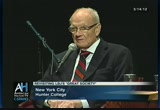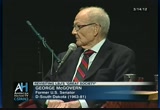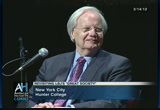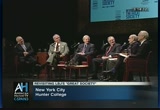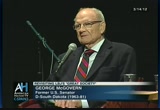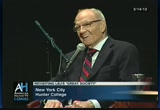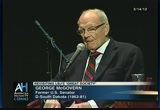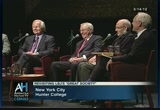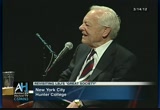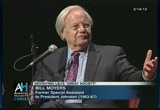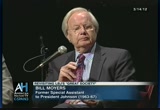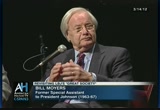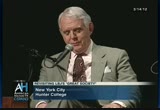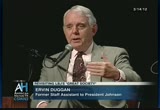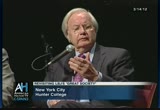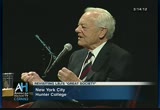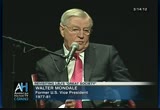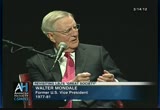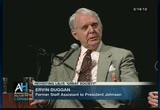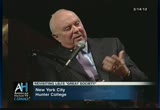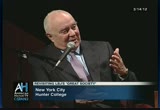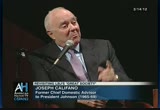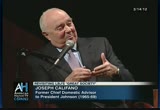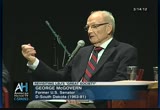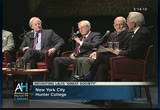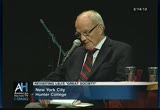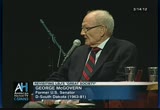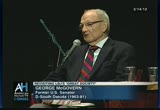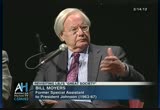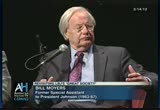tv [untitled] July 4, 2012 1:00pm-1:30pm EDT
1:00 pm
compartmentalized, didn't he? because frankly, he needed you on a couple of things. >> before i ran for president, i had been hammering our vietnam involvement for ten years. i finally decided that the senate is a great place, but one senator from a small populated state like south dakota, is not going to have much impact on a national policy such as a war. >> i called up the white house and bill moyers took my call. and i said, do you think you could arrange for me to see the president. and without thinking about it, too long, he said, yes, you can. you want to come tonight about
1:01 pm
7:00. the very same night i thought he would say it would be a week or so before we could get to you. but that was the way the johnson white house functioned. it's the way the president functioned. so i walk in there that night, it was the first time i had been in the oval office, and i have to confess, i was kind of overwhelmed. with the atmosphere. and johnson is a big man. he got up and he took hold of both of my lapels here. and he, he stood up, he was two or three inches taller than i was. he got his head way back like this. and i was looking right up his nostrils. and i learned later this was called the nostril treatment. and he said, now, george, i know
1:02 pm
why you're here to talk to me. i had joe rau in here the other day. and he wants me to just pull out of there today. get our troops out of there. you know i can't do that. then i had scoop jackson in here and he thinks we ought to bomb the hell out of them. and i can't do that. so i'm just following a common-sense middle course. i'm trying to honor the troops that are there, i'm trying to keep in mind that the standing of the united states and the world is on the line. and we just can't surrender to a bunch of little communists out there in vietnam. it was difficult for me to speak
1:03 pm
after that. but i -- i said, well, mr. president, i have a memorandum here. i didn't want to take too much of your time. but i'd like to leave that with you. it kind of reviews the history of how we got in there. it also tells what happened to the french. they had the best army in europe. in vietnam. and they got whipped by those miserable communists out there. and he said, i can either throw bombs at them or i can't pull out. i'm just trying to follow a middle course. i said, well maybe you can look over my -- he said george, god darn it. don't give me another memorandum. i got, i got a drawer full. of memorandums from bill
1:04 pm
fullbright and mike, mike mansfield and god knows how many else. and i don't have time for history right now. i've got boys out there on the front lines that are dying, that are fighting for their country. i can't sit around here reading history lessons. so i thought i wasn't communicating very well. and i thanked him for listening to me and i left. but he never held my opposition to the war against me. do you think he did, bill? you were in the white house. >> no, you were exceptional. >> right after i won the presidential nomination, in '72, i called him and said, we'd like to come down to texas.
1:05 pm
and see you and sarge shriver, who was one of my vice presidents, went down with me. and they met us at the plane. we landed right at the ranch and the president and lady bird were each driving a golf cart. and sarge went with lady bird. and i went with the president, we went up to the house and it was a delightful experience. he said, now let's get one thing clear, george. you think i'm crazy for keeping us in vietnam all these years. i didn't start that war. but i'm expected to finish it. i know you think i'm goofy on it and i know you are. and he gave me some good advice.
1:06 pm
he said george, if i were you, you've been a great kretic. of your government. the last ten years. if i were you, i would announce the president telling the country how much they have done for you. and how much the united states government means to you. tell them about your war days. tell them about what you as a junior senator from south dakota, the debt you feel to the people of the united states. you know, he couldn't have given me better advice. i'm sorry that other things crowded in. and i didn't stick with that routine very much. but i should have. i think i would have gotten more votes. i -- i might have carried two
1:07 pm
states instead of one. >> bill moyers, what was it like to just work for lyndon johnson? >> had you to run just to stay up when he was walking. he was, he was, he never stopped. he was consuming in his passions and in his objectives and demanding. but he never asked more of us than he gave himself. it took 12 of us, ten of us i think there were in white house to just keep up with him. he was 13 as i've said before, the most interesting and complicated men i have ever met. and playing his moods and reading them and trying to integrate them and advance an agenda that all of us had a part of, was really a demanding task. it was exhilarating, it was exhausting. it was rewarding and it was sometimes punishing. but you always were satisfied
1:08 pm
that the result made the effort worthwhile. >> evan, how did he know so much? he i mean he seemed to know everything about everybody. >> well, j. edgar hoover helped him. he was a sponge of political intelligence. today big controversy over these political intelligence firms that look through the intelligence. lyndon johnson got it in the normal course of his business. he had the three teletype machines in his office. the three television sets in his office. he talked incessantly to people. you thought when he was talking, he was only talking. but he was listening to your responses and to the silence between the sentences of your response. and he always knew other people's price. other politician's price. for some, it was a dinner at the white house. for some, it was a signed dpo e
1:09 pm
photograph for a mother-in-law. for others it was a dam. he once said to frank church, the senator from idaho, who he never forgave, the way he did you, for opposing him. when senator church tried to tell him what to did about vietnam and started quoting walter litman, the prominent communist of the day. he said i tell you what, frank, the next time you want to dam the snake river, you talk to walter litman about it. on the original point, i spent more time at his instruction with republicans than i did with democrats. because he knew, as you said, he was going to need those votes. and judith and i, we worked together on our broadcast. and we were screening a small clip the other day from the signing of the 1964 act. civil rights act. which walter was the floor manager. and delivered. when he finished signing that act with all of the pens, one would have thought, i thought, standing in the back of the room, he would take the first
1:10 pm
pen and hand it to martin luther king jr. he didn't, he took the first pen and handed it to everett dirksen. that was everett dirksen's reward for doing what lyndon johnson persuaded, thought he persuaded him to do in that phone call. he understood -- you asked about washington today? president obama does not enjoy personal persuasion. he doesn't like other politicians, at least that's the impression i get as a journalist. i don't know him personally. lyndon johnson did. and he also did not have a party of no. the republican party today is not the party that we confronted and ran against in 19d 64. it's a party of no. so much rhetoric has poisoned people's attitudes towards the government that it is to the republican party's interest to make government inefficient, so that they can use it to gain power. we didn't have that. there were still, even on most, most of the republican side, burke higgenlooper from iowa,
1:11 pm
people like that, desired to make government work, even though they wanted a smaller government than we did. and there was the feeling that government needed to deliver. and he exploited that. knowing that they had that in common. that isn't the case today. you know that better than anybody. >> let me ask you, evan, you were young staffer working for him. we know he liked fdr in sort of almost thought of him as his father. but who were his role models? >> i asked him once, in the closing months of the administration, we were flying to texas. there wasn't as much to do and we had more time to talk. and i asked him on the plane -- what other politician, mr. president, other than yourself, do you most admire. i phrased it carefully. and i expected that he would say, richard russell of georgia. i expected that he would say
1:12 pm
fdr, who clearly, there was an umbilical link between the two of them. i expected he might say, mr. sam rayburn. without hesitation, he said -- the most skilled politician i ever knew in washington was dwight d. eisenhower. and he began talking about eisenhower's political genius, which was a revelation to me. and he said, who do you think the first person was that i called from air force one after the assassination on the second person after i called rose kennedy? i called eisenhower. i said i haven't been elected in this terrible tragedy. i don't know what to do. i want you to come to washington right away and give me advice. and he said, eisenhower came down from gettysburg and he said, mr. president, i'm a military man. i give advice in writing. and my secretary, ann whitman, is in retirement in an apartment on connecticut avenue, let her come down and i will dictate to you, while you go to the events of the funeral, i'll dictate my
1:13 pm
advice. and president johnson said, the advice that he wrote in that memo became the script for the first 100 days of my presidency. and he said, during that entire dime when eisenhower advised me to speak to a joint session of the congress and make that my inaugural address, to call business leaders together and show the unity of the business community. all of these things eisenhower recommended, take the kennedy program and make it a memorial to the slain president, he said, during all the time that i was following the script, my approval ratings were way up in the 70s. and he said, when i came to the last page of the script, and it ended, my approval ratings went down to 50. but i thought it was amazing that, and an example of this bipartisanship that you heard other people in this panel talking about, that he selected a republican president as the most skilled politician he had
1:14 pm
known. >> that's a new story, i never heard that before. >> two quick points, in 1954 when i was a summer employee on his staff. i was 20 years old, a clerk in the mail room of no significance. he call immediate over and insisted i go it an eisenhower press conference. the first press conference i had ever seen of a president. and he said, i can't remember the exact quote. but it was, he said, you watch president eisenhower. he knows how to get what he wants by not appearing to want it. and johnson was partly that way. then on the night we flew back from dallas after the tragedy there, went to the executive office building where the vice president had his suite, the first call he asked me to make was to dwight eisenhower and he allowed me to listen to that conversation. and again, after that conversation was over, he said, an amazing man, an amazing man. he just understood how you could get what you want by not appearing to want it. twice he said that.
1:15 pm
>> senator mondale, i'm really struck by what i'm hearing here. here is a man who called people when he needed help and was not afraid to say -- i really need some help here. i really need you to help me. you're kind of, you can talk about both of these worlds. how is, and bill touched on this. how is washington today, different from what it was in those days. >> well i think bill touched on it. i'm, i would say depressed about it. i was there in the senate, you know, a young man, replaced humphrey who became the vice president. johnson was in his honeymoon period. he had this wonderful program of social justice that i believed in. and believe in today. and he was using his energy and his strength, we talked about, to keep the system moving.
1:16 pm
and he did it onis basis. don't forget about 20 democrats were southerners. and most of them were committed to discrimination and that was the center of their political careers. a lot of good people there, but that was the reality. so in order to get progressive legislation passed. the numbers told you, unless you could do it on a bipartisan basis -- forget it. so everything we did there, and johnson was leading, hubert was in there, the rest, began with how can we make this a bipartisan program. every civil rights bill of any significance ended up in dirksen's office, if you wanted the civil rights act, sooner or later you went to see dirksen, and if he would sign on, you could pass it. if he wouldn't, he wouldn't. i remember i -- handled fair housing and it looked to finally they were going to pass it.
1:17 pm
and phil hart said to me, what can i do for you? i said, i would like my name on this bill so i can tell the folks back home i'm getting something done. can't do that, he said, i said, why not? he said dirksen's name goes on the bill. that's how we got things done. now it seems to me that whole dialogue. everything is a train wreck. it's, there is no -- sense of getting things done or serving broader purposes. and we've got to do something about it. johnson did in his time. i don't think it's being done now. >> what happened? what, what caused this change? evan? >> i think what we've seen over the years, is what might be called the emptying out of the center. richard scanlon, who was president kennedy and president johnson's census director used to say that the game of politics in america is played between the 45 yard lines. and if you stray into the end zones, you lose support.
1:18 pm
the congress of the united states today has emptied out the space between the 45 yard lines, and everybody on both sides is clustered in the end zones. and solutions happen in the center. solutions happen when people between the 45 yard lines get together and work things out. practical people. i had a young lawyer working for me at the fcc who once observed that political agnostics are the ones who get things done in washington. those who are not ideologically so committed to one side or another that they cannot compromise. those political agnostic who is simply love the process, who love the idea of solving problems together, get together and they're not so ideologically divided, they can find solutions together. we've had an emptying out of the center and a filling up of the extremes, both in the country and in the congress and i think that's the change. >> well, joe, i mean compromise has now become a dirty word.
1:19 pm
compromise is something that will get you beat when you run for congress now. if you say i'm willing -- >> and i have to give. and god knows, we gave. but i think there are a couple of other things. i think there's, there was real focus. i mean i don't think any of us had any doubt about where johnson wanted to go. what he wanted to get done. civil rights was an over-arching issue, he was going to get it done. whatever the diversions there were, the war on poverty, or the health bills, or what have you. i think he also knew how to grab an opportunity? . mine even the grimmest opportunity, we proposed civil rights in 1966. nothing happened. '67, nothing happened. finally, in early '68, he managed to get it out of the senate. i mean the fair housing bill, i'm sorry. finally managed to get the fair housing bill out of the senate. it was impossible to move it in the house.
1:20 pm
you may recall, emanuel seller, the congressman from brooklyn, jewish district, with blacks moving in -- didn't want to touch the bill. martin luther king is assassina assassinated. i will never forget this. it was an awful night. the next morning before the -- he vited all the black, all the black leaders in from all across the country to sit around that cabinet table that morning. he said to me, we're going to get our civil rights bill. give me a draft of a letter to speak to mccormick. if we get nothing else, we'll get our fair housing bill now. he sent a letter to the speaker that morning. and he sent a letter to jerry ford. he said we've got to do this. and we had to find a floor manager. he knew seller wouldn't take it. peter radino, talked to peter
1:21 pm
radino into taking the bill on the floor. peter radino, we passed the fair housing bill in a month. peter almost lost re-election in newark in 1968 because he was the floor manager for that bill. he barely won. but then years later as he had won black primary opponent after another, he kept beating them. because of what he did on the fair housing bill. and the other thing, let me just -- bill knows this. i mean he had a phenomenal sense of humor. i mean, i think back to those awful riots after the king assassination. i would keep bringing him reports from the fbi, one city after another. we had to bring in troops. and we kept doing that. and then, i got this message about stokley carmichael. he said stokley carmichael is
1:22 pm
organizing a mob at the corner of 14th and u streets to march on georgetown and burn it down. georgetown was where all of these columnists and tv commentators that were driving johnson crazy lived. and johnson looked at it and read it, and said, god damn, i waited 35 years for this night. >> two other quick nights point that. >> i want to say as a critic on the vietnam issue, that before i went into politics, i was a history professor. do you believe that, fred? >> i do. >> anyway, i used the gi bill to go all the way through northwestern university, to a ph.d. in history. and i think just thinking about what johnson did on civil
1:23 pm
rights, what he did on poverty, what he did on education, all these other things. that whole great society program, those were good ideas. some people ridiculed the great society. why would you ridicule a president who is trying to build a great society in the united states? i thought every point in that program made america stronger. and if we would have gotten the whole thing in full force, it would have made us even stronger. i honestly believe. and i'm speaking now as an old history prof, that with the exception of roosevelt, who had four terms in the white house, i think lyndon johnson was the greatest president of the 20th century. [ applause ]
1:24 pm
>> nsenator, let me ask you one thing, if kennedy had not gone to vietnam, do you think, had it do do over, do you think lyndon johnson would have gone to vietnam? >> i can only say this. i never knew during all that debate time about vietnam, that president johnson knew that we made a dreadful mistake. getting involved in vietnam. militarily. you read the brilliant historian who is on the program tomorrow, mr. beschloss, who published a book on the johnson tapes. i didn't even know johnson had a tape going, i thought that was just nixon. but here is the tapes and he's
1:25 pm
talking to richard -- >> russell. >> richard russell of georgia. who was chairman of the senate foreign relations committee. and this is in the first days of when president johnson was sworn in. after john kennedy's assassination. in those first days, he said dick, what the hell are we going to do about that mess out there in vietnam? we never should have gotten into that place. and dick russell, who i also didn't know was, felt the same way about it, said, i agree. it's a mess. i don't know how you get out of there now. maybe one thing you could do, you could find those guys out there in saigon that got rid of old ziem. who was assassinated. and get that gang to send a
1:26 pm
communique' to us, asking us to leave. and he said, maybe, if our so-called allies are asking us to leave -- i don't know how you get that done. he went on at some time about it. dr. beschloss can give more on this. but lyndon johnson understood perfectly everything i knew about vietnam. everything fullbright knew. everything mike mansfield knew. but he didn't know how, as a sitting president of the united states, to get out of there without looking like we, he was the first president to surrender. in a war. and he was very proud of america, he was proud of our country. and he had great feeling. he was very proud of the united states government. not like these crazy extreme right-wingers that are assailing
1:27 pm
the federal government day and night on television, wherever they can be heard. he loved, lyndon johnson loved the united states government. he loved the senate, he loved the house of representatives under sam rayburn. he admired the supreme court. he loved the constitution, the declaration of independence, the whole she-bang. he didn't want to surrender under those conditions. >> you feed into what i was going to say a moment ago about what has changed. he was a master parliament aari. he respected procedure, yes, politics is improvisation, it's scratch my back, i'll scratch yours, but it's also about procedure. and that's changed. when richard russell, who was list dutch uncle, he was much
1:28 pm
closer to lbj, than lbj was to fdr. when richard russell was beginning to mount a filibuster on the civil rights legislation, lbj asked him to come down to the white house. he called me on the phone to my office and said, bring me a copy of the constitution. i didn't know why, but i took him a copy of the constitution. and he asked me to stay. and he said put less scotch in my drink than you do in richard russell's, which i did. so when russell was ratcheting up his argument about why he had to lead a filibuster. lbj handed him the constitution. and said dick, go through that. and russell said, i've read it, i know what's in the constitution. he said no, go through it, mention how many times it mentions the filibuster. the constitution doesn't mention the filibuster once. one of the great differences, we only needed 51 votes to pass an
1:29 pm
historic piece of legislation. now you've got to have 60. that's a change and the republicans have been masters of that. and the democrats to come extent. the other thing that he understood very keenly, is that it wasn't only procedure, it was understanding what the other fellow -- no, it was understanding -- the other big change bob has been, and i wash you on your show and i see you trying to rationalize with these guys, the delusional has come in from the margin and now occupies centers of power in the republican party we had a great time running against goldwater in 1964. because the right was then funny. it was humorous. most of our commercials in the '64 campaign were humorous commercials. today, those delusional people are running one of the two major parties in this country.
101 Views
IN COLLECTIONS
CSPAN3 Television Archive
Television Archive  Television Archive News Search Service
Television Archive News Search Service 
Uploaded by TV Archive on

 Live Music Archive
Live Music Archive Librivox Free Audio
Librivox Free Audio Metropolitan Museum
Metropolitan Museum Cleveland Museum of Art
Cleveland Museum of Art Internet Arcade
Internet Arcade Console Living Room
Console Living Room Books to Borrow
Books to Borrow Open Library
Open Library TV News
TV News Understanding 9/11
Understanding 9/11